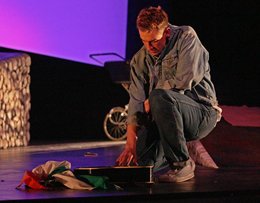Stuart Marshall’s set for Millennium Forum's new production of Carthaginians is a minimalist pair of raked platforms set before a blazing blue trapezium of sky. The white stone facings on the platforms evoke Derry’s famous walls, a graveyard, and a bleak, sun-bleached space of classical tragedy. The three women who are the first characters on the stage, one of them nursing a sick bird, also suggest mythic figures: the Three Graces or the Judgement of Paris; and their presence in the graveyard recalls the three Marys at the tomb of Christ. As the plot unfolds, the goddesses in the Judgement of Paris – Hera, goddess of marriage and childbirth, Aphrodite goddess of love and Athene goddess of wisdom – suggest the particular qualities and histories of these three female characters. The women are waiting for the dead to rise.
 The opening scene, in its setting and in the presence of the women, evokes tragedy, grief, and the potential for resurrection. Carthaginians tells the story of seven men and women from Derry and their individual responses to the events of Bloody Sunday. Maela camps by the grave of her daughter who died of cancer, aged 13, on Bloody Sunday. Refusing to admit that her daughter is dead, she insists that nobody died that day, and that her daughter will rise again. Hark joined the IRA after Bloody Sunday and served time in prison; Seph was an informer who will no longer speak; Greta is childless and despairing; Sarah is a former drug addict and prostitute, ex-girlfriend to Hark; and Paul spends his time building a pyramid of garbage. The master of ceremonies is a young gay man, nicknamed Dido. Dido occupies a liminal space, both part of this grieving community and outside it: he brings in supplies of food and cigarettes each day in a pram, intervenes to move the action along, elicits confidences from the characters, and scripts the play within a play The Burning Balaclava under his drag persona of Fionnuala McGonigle. As Dido he is Queen of Carthage, and therefore not the Queen of a ruined city but the founder of a famous city. Dido, by his name, recalls destruction but he also signifies the creation and founding of new, great possibilities.
The opening scene, in its setting and in the presence of the women, evokes tragedy, grief, and the potential for resurrection. Carthaginians tells the story of seven men and women from Derry and their individual responses to the events of Bloody Sunday. Maela camps by the grave of her daughter who died of cancer, aged 13, on Bloody Sunday. Refusing to admit that her daughter is dead, she insists that nobody died that day, and that her daughter will rise again. Hark joined the IRA after Bloody Sunday and served time in prison; Seph was an informer who will no longer speak; Greta is childless and despairing; Sarah is a former drug addict and prostitute, ex-girlfriend to Hark; and Paul spends his time building a pyramid of garbage. The master of ceremonies is a young gay man, nicknamed Dido. Dido occupies a liminal space, both part of this grieving community and outside it: he brings in supplies of food and cigarettes each day in a pram, intervenes to move the action along, elicits confidences from the characters, and scripts the play within a play The Burning Balaclava under his drag persona of Fionnuala McGonigle. As Dido he is Queen of Carthage, and therefore not the Queen of a ruined city but the founder of a famous city. Dido, by his name, recalls destruction but he also signifies the creation and founding of new, great possibilities.
Although Carthaginians can be discussed alongside Friel’s Freedom of the City, which is also a fictionalised engagement with the events of Bloody Sunday in Derry in 1971, the play primarily fits within a body of translations and adaptations of ancient Greek tragedy in the Irish theatre of the 1980s and 1990s. These plays – Tom Paulin’s The Riot Act (Antigone) and Seamus Heaney’s The Cure at Troy for example – explore the tragedy of Northern Ireland through the metaphor of Greek tragedy. Watching this production's premiere in Derry is an emotional experience since it has a particular resonance with this audience, addressing events which were only finally resolved in the past year with the publication of the Saville Report.
 The performances are strong throughout, and Chris Robinson’s performance as Dido is particularly engaging. His entrance in drag, announcement of his new work The Burning Balaclava and direction of the play is a theatrical set-piece that mocks and inverts sectarian and gender stereotypes. Through this, Dido challenges the characters – and McGuinness challenges the audience – to confront their prejudices and recognize how limiting and reductive they are.
The performances are strong throughout, and Chris Robinson’s performance as Dido is particularly engaging. His entrance in drag, announcement of his new work The Burning Balaclava and direction of the play is a theatrical set-piece that mocks and inverts sectarian and gender stereotypes. Through this, Dido challenges the characters – and McGuinness challenges the audience – to confront their prejudices and recognize how limiting and reductive they are.
In many ways this production is a reminder of what a good play Carthaginians is: it borrows the classical form and incorporates elements of popular culture such as drag performance, the musical, and burlesque. The use of music comments on the setting and the characters: Sarah’s repeated singing of 'In the Port of Amsterdam' reveals her past experience more powerfully than her pushing up her sleeves to show that the tracks on her arms have now faded; the singing of 'We Shall Overcome' immediately recalls the Civil Rights movements in Northern Ireland and elsewhere; while Don McLean’s 'American Pie' and 'Babylon' express the play’s thematic exploration of grief, memory and forgetting.
The main weakness is in the play’s final scenes in which the characters reveal the truth behind their personae, and Maela confronts the fact that her daughter is dead. It is difficult to see how these scenes can be played other than as melodrama; yet the overwrought emotion is at odds with the earlier scenes and with the quietly hopeful ending. However, under Dunbar’s direction the work is clear and well paced and the comic scenes work effectively juxtaposed against the more moving, emotional material. This is production is well worth seeing.
Lisa Fitzpatrick lectures in drama at the University of Ulster.